MINNEAPOLIS (CNS) – For more than 50 years, Father Harry Bury has been a voice calling for peace and justice in a world fraught with violence and poverty.
He did so again during the annual assembly of the Association of U.S. Catholic Priests, held in a Minneapolis suburb June 21-24.
The 91-year priest of the Archdiocese of St. Paul and Minneapolis organized a group of his fellow priests attending the assembly to visit the site where George Floyd died while being pinned to the ground under the knee of a police officer.
He wanted the priests to better understand the community where the incident occurred.
At George Floyd Square, the priests, numbering about 60, not only had the chance to see life in the community, but they also heard from the Rev. Jerry McAfee, a civil rights activist who is pastor of New Salem Missionary Baptist Church in North Minneapolis.
Rev. McAfee challenged the priests to do more to counter racism in society and religious institutions, including the Catholic Church. He also urged the priests to reach out to parishioners who work in law enforcement or in the judicial system.
The priests also prayed at the site.
The trip for the priests is the kind of activity Father Bury has undertaken to help teach people about overcoming injustice.
“I wanted to live what I preach. This (peace activism) is my philosophy of life and this is my life lived,” he told the Minneapolis Star Tribune.
During its assembly, the AUSCP honored Father Bury, a Minneapolis native, with its St. John XXIII Award for his long years of work as a nonviolent activist.
Father Bury has reached out numerous times in his life as a priest to seek healing, promote peace and address injustice through word and deed.
He was among the people who showed up outside of a Minneapolis police precinct two days after Floyd’s death to help deescalate tensions between police officers and protesters. He later told The Catholic Spirit, newspaper of the Archdiocese of St. Paul and Minneapolis, that during the protests, he both prayed and tried to talk to people on both sides.
“Being present is not something small,” he said. “Showing up is what’s important. And that’s why I was there. I was showing up. If all of us people who are for nonviolence would show up, there wouldn’t be any violence.”
Father Bury has been showing up since his days as a campus minister at the Newman Center at the University of Minnesota from 1965 to 1970. He said the students opened his eyes about the tragedy of the Vietnam War. He began to join them and lead them in anti-war protests.
After the Newman Center, Father Bury attended graduate school, which led to his peacemaking efforts. Assigned to write a paper, he asked the professor if he could study how the Vietnamese people felt about the presence of American soldiers in their country.
While visiting Vietnam, he was asked by Vietnamese priests to come back to their country for a demonstration. He returned in 1971 and chained himself to the U.S. Embassy Gate in Saigon to protest the raging war.
Over the years, Father Bury’s ministry crisscrossed the globe. He became a distinguished professor and speaker in systems management at Baldwin Wallace University in Ohio, and a lecturer at other universities. He befriended St. Teresa of Kolkata before she was famous, and a close bond developed. He concelebrated her beatification Mass in Rome.
In his 2018 memoir, “Maverick Priest: A Story of Life on the Edge,” Father Bury describes his 1969 arrest for attempting to celebrate Mass in the Pentagon for fallen Vietnamese and American soldiers.
A year later, Father Bury joined other peacemakers to fly to Hanoi, Vietnam, and bring back three captured American pilots. And in 2005, he traveled to Gaza to help form a human shield between Israeli settlers and Palestinians. He was abducted and held at gunpoint, but eventually released.
Ordained in 1955, Father Bury is now retired from active ministry, but his work is far from done. In 2017, he co-founded Twin Cities Nonviolent, an ecumenical group that partners with dozens of other peacemaking organizations. When an opportunity presents itself to teach the Gospel of nonviolence, Father Bury is prepared to act as he did after Floyd’s death.
The AUSCP assembly marked the organization’s 10th anniversary. About 150 attendees focused on the theme “Where do we go from here?” throughout four days of programs.
“It’s our 10th anniversary assembly, but our focus is on the future,” said Father Greg Barras, chairman of the association’s leadership team.
Speakers such as Bishop William A. Wack of Pensacola-Tallahassee, Florida; Michael Sean Winters, columnist at National Catholic Reporter; and Shannon Dee Williams, assistant professor of history at Villanova University, guided the priests through a strategic planning process that helped the association consider how its future may unfold.
The program included a daylong retreat led by Father Michael Joncas, a music composer and a priest of the Archdiocese of Minneapolis and St. Paul; contemplative reflections led by Sister Margie Klein, a member of the School Sisters of Notre Dame; and daily Mass including liturgies celebrated by Archbishop John C. Wester of Santa Fe, New Mexico, and retired Bishop Richard E. Pates of Des Moines, Iowa.
– – –
Contributing to this story was Christina Capecchi.

